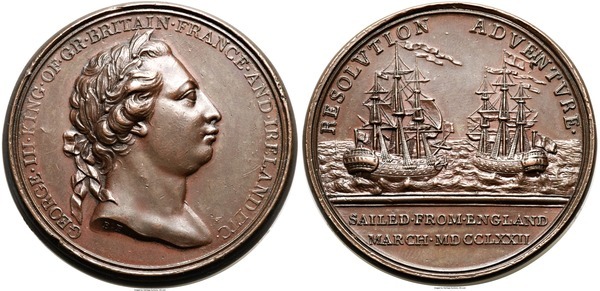
In the annals of maritime history, few names resonate as deeply as that of Captain James Cook, the intrepid British explorer whose voyages charted uncharted waters, expanded the known world, and forever changed the course of global exploration. Among the many tributes to his enduring legacy stands the Captain Cook Medal, a symbol of his pioneering spirit and the lasting impact of his expeditions.
The Origin Story: A Token of Admiralty
The Captain Cook Medal was first conceived in the late 18th century, a time when the Age of Exploration was in full swing and the British Empire sought to assert its dominance on the high seas. Instituted by the Royal Society of Arts in 1784, the medal was intended to honor individuals who made significant contributions to the fields of navigation, exploration, and scientific discovery.
Named in honor of Captain James Cook, who tragically met his end during his third voyage to the Pacific in 1779, the medal became a prestigious award coveted by sailors, scientists, and adventurers alike. Its design, featuring a profile portrait of Cook on one side and an allegorical representation of Britannia on the other, embodied the ideals of exploration, enlightenment, and imperial ambition that characterized the era.
A Symbol of Exploration and Enlightenment
For over two centuries, the Captain Cook Medal has served as a tangible reminder of the spirit of discovery that drove Cook and his contemporaries to brave the unknown reaches of the globe. Awarded to individuals who distinguished themselves through their contributions to geography, cartography, and the natural sciences, the medal became synonymous with the pursuit of knowledge and the expansion of human understanding.
Recipients of the Captain Cook Medal include some of the most renowned figures in the history of exploration, including botanist Joseph Banks, naturalist Charles Darwin, and navigator Matthew Flinders. Their groundbreaking discoveries, documented in the logs and journals of their expeditions, continue to inspire generations of scholars, adventurers, and armchair explorers to this day.
Legacy and Controversy
While the Captain Cook Medal remains a cherished symbol of exploration and enlightenment, it is not without its controversies. In recent years, the legacy of Captain Cook himself has come under scrutiny, as historians and indigenous rights activists have reexamined his role in the colonization of indigenous lands and the dispossession of native peoples.
For many indigenous communities, particularly in the Pacific region where Cook conducted much of his exploration, the arrival of European settlers brought untold suffering and upheaval. The celebration of Cook as a heroic figure, they argue, overlooks the darker aspects of his legacy and perpetuates a one-sided narrative of conquest and colonization.
In response to these concerns, some institutions have sought to reevaluate their commemoration of Cook and his expeditions, acknowledging the complexity of his legacy and the need for greater recognition of indigenous perspectives. While the Captain Cook Medal continues to be awarded in recognition of achievements in exploration and discovery, its meaning has evolved to reflect a more nuanced understanding of history and the impact of colonialism.
Honoring Exploration, Acknowledging History
The Captain Cook Medal stands as a testament to the enduring legacy of one of history’s greatest explorers and the spirit of adventure that drove him to seek out the unknown corners of the earth. While its symbolism may be contested, its significance as a token of exploration and enlightenment remains undiminished.
As we reflect on the legacy of Captain James Cook and the age of exploration he helped to define, let us also remember the voices of those whose stories have too often been overlooked or marginalized. In honoring the achievements of explorers past and present, may we strive to acknowledge the full complexity of history and the enduring impact of human encounters with the unknown.